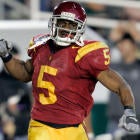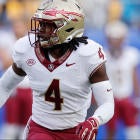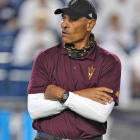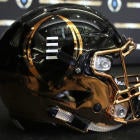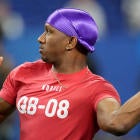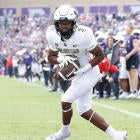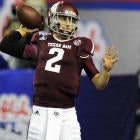Former San Diego State football player Anthony Nichols formally objected Friday to the NCAA’s $75 million concussion settlement, with his lawyer telling a judge the deal is "a mess of a settlement."
Chicago attorney Jay Edelson filed a 28-page objection in the Northern District of Illinois, arguing the settlement doesn't cover medical costs for former college athletes as the suit originally intended. Edelson has represented Nichols and former Pittsburgh football player Frank Moore since they attempted to intervene in the Adrian Arrington settlement last October. Only Nichols, a San Diego State offensive lineman from 1989 to 1992, is identified as objecting to the settlement.
In the court filing, Edelson claims that only about 3,500 of the 4.2 million class members are expected to receive medical monitoring tests over the 50-year span of the program. He states those tests will deliver to the class a total of “perhaps $140,000 actual value.”
The NCAA and the plaintiffs announced a settlement July 29 that would establish a 50-year medical monitoring program for all current and former college athletes. Out of the $75 million pot, $70 million would go toward screening (minus up to nearly $16 million in attorney costs) and $5 million would be used for research.
The settlement would cover only diagnostic medical expenses, not actual treatment -- a criticism by some opponents of the deal. Athletes would preserve their rights to individually sue universities, conferences or the NCAA for personal-injury damages and waive their claims collectively.
The plaintiffs previously showed how they came up with the $70 million figure for medical monitoring. Part of that report said college football players are three times more likely than the general public to have symptoms related to chronic traumatic encephalopathy (CTE), a debilitating disease associated with repetitive head trauma.
“If the NCAA gets away with this and forces millions of people to forego the right to participate in a class action without getting a single benefit in return, it will, in one fell swoop, eliminate the vast majority of the personal injury liability that it is most fearful of,” Edelson wrote.
Edelson states the class claims are worth billions of dollars, citing a statement co-lead counsel for the plaintiffs, Joe Siprut, made to CBSSports.com on the morning of the settlement announcement. Edelson argues that the individual claims are too small “to allow vindication.”
Since there are very few individual concussion claims in court now, “the alternative to a class action therefore isn’t a groundswell of individual claims -- it’s essentially no claims -- which is the entire point of the class waiver,” Edelson wrote.
Co-lead counsel for the Arrington plaintiffs, named after the former Eastern Illinois football player who sued the NCAA in 2011, expressed frustration at Edelson's claims and tactics following a July 29 preliminary settlement hearing. Steve Berman, the Arrington plaintiffs' co-lead attorney, said medical expenses aren't covered because the NCAA would not assume class-wide liability since injuries vary based on individual cases. Also, Berman said most athletes would have their treatment covered by their own insurance.
“We’re not letting the NCAA off easy,” Berman said. “The notion that there are billions of dollars of claims out there is ridiculous. … There’s maybe two dozen concussion cases on file in the country right now so Jay is just flat-out wrong, and he’s flat-out wrong on the law.
“Look, I represent people who have individual concussion claims. I have a battery of experts that are needed to do the right things for those kids in that case. You can’t do that in class-action. (Edelson) doesn’t even have a case on file and he’s coming into court telling us how we should be doing this?”
Edelson’s previous claim that the settlement is simply about attorneys fees is “sour grapes,” Siprut said July 29. “That sounds like the words of someone who throws muck against the wall and see if something sticks. It’s always easy to take potshots at the attorneys because they might actually get paid for four years of hard work.”
Judge's biggest question with settlement
U.S. District Judge John Lee’s biggest question at the hearing about the settlement was a technical one: Can a settlement class certified under one federal provision waive rights that might otherwise only be properly pursued by a class certified under a different provision? That issue is “going to be in some ways the heart of the settlement to ensure that the rights of the absent class members are protected,” Lee said.
The Arrington plaintiffs are trying to certify the class under a “hybrid” option they say has been approved by the Seventh Circuit: Combine Rule 23(b)(2) certification with the Rule 23(d) procedural safeguards of notice and the right for class members to opt out.
The Arrington plaintiffs wrote in a filing earlier this month that Rule 23(b)(2) is proper for certification “because the grounds for liability -- the NCAA’s failure to adopt consensus best practices in concussion management -- are based on NCAA conduct that is ‘generally applicable to the class.’” Because of that, the primarily relief sought in the settlement -- medical monitoring and changes to the NCAA’s concussion-management policies -- “is injunctive or equitable in nature,” the Arrington plaintiffs wrote. They added that the settlement class satisfies Rule 23(b)(3) requirements.
In his objection, Edelson claims the Seventh Circuit case law cited by the Arrington plaintiffs are “red herrings” because they “say nothing about allowing class damages releases … in exchange for no relief.” The attorneys’ “eleventh-hour request” to certify under Rule 23(b)(3) “doesn’t magically make the release less substantively troubling,” Edelson wrote.
Edelson argues that nearly 90 percent of the class will receive no benefit from the settlement. He cites an expert report in the settlement from Bruce Deal, who projected that 3,526 medical tests would be provided over the 50-year monitoring period.
The remaining class members who supposedly benefit from the settlement are 460,000 current college athletes, who “get nothing other than the NCAA’s promise to recommend to its member schools that they update certain concussion guidelines,” Edelson wrote.
Edelson argues that the supposed injunctive relief of new NCAA concussion guidelines are already in place and cites the NCAA’s claim that those changes were not a result of this litigation. The objection states that approximately 262,000 athletes in non-contact sports had no representation in negotiations. The settlement describes some safety requirements for NCAA contact sports -- football, lacrosse, wrestling, ice hockey, field hockey, soccer and basketball -- moving forward.
Because of that language, “the majority of student-athletes are having their rights traded away for basically nothing, while the select student-athletes who play sports within the Settlement’s narrow definition of ‘Contact Sports’ receive a promise from the NCAA to recommend to its member institutions that they pass guidelines already in effect,” Edelson wrote.
An expert report in the settlement states the risk of CTE symptoms in NCAA contact sports other than football is one-and-a-half times higher than the general population.
Edelson’s objection was submitted by seven law firms, including Clifford Law Offices in Chicago. That firm is led by high-profile, personal-injury attorney Bob Clifford, whose office has represented families of plane crash victims for 30 years.
Lee will hold another settlement hearing on Sept. 19.












